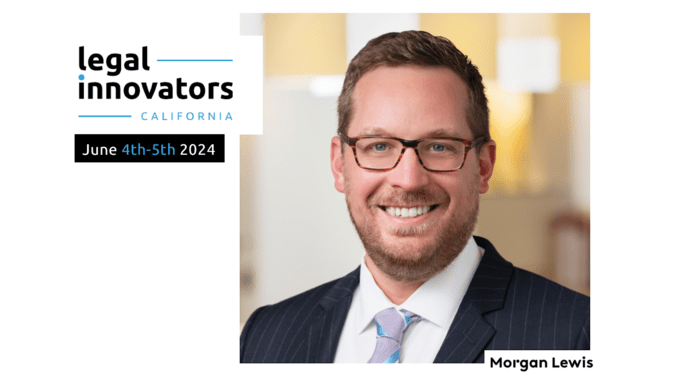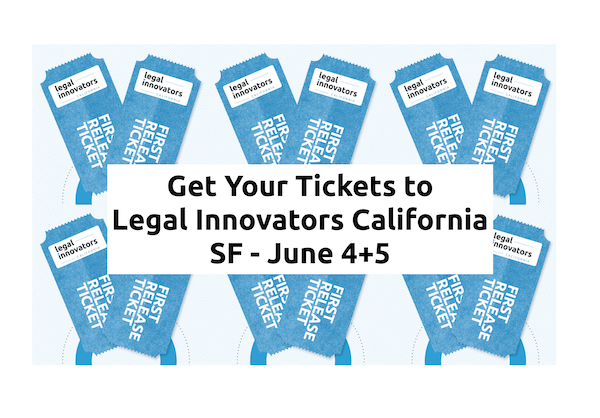
Josh Rosenzweig is the new Senior Director of AI and Innovation at Morgan Lewis & Bockius. Artificial Lawyer caught up with him to hear about his outlook on legal tech, how the firm is approaching genAI, as well as the firm’s ‘business of innovation’ approach.
Josh will be one of many great speakers at the Legal Innovators California conference, June 4 + 5, in San Francisco – see below for more information and tickets to attend the pioneering two-day conference.
First, what is your role at the firm?
I am beginning my sixth year at Morgan Lewis and as I look back, I realize how my role has evolved with the advancements in legal technology. My role all started with the multi-year project to establish a low-code development factory, which helped to compliment Morgan Lewis’s commitment to exceptional client service in meeting client demands and identifying new business opportunities.
Over the years, the low-code factory project has grown into a comprehensive digital transformation initiative focusing on research, development, and acquisition of scalable digital tools, allowing us to allocate 75% of our time to human-centered design.
Throughout these changes, my objective has remained persistent: to empower our attorneys to differentiate their practice by harnessing the digital tools at their disposal.
Differentiation only sometimes necessitates the acquisition or development of new technology. Instead, we have cultivated a digital framework that nurtures a collaborative environment, champions innovation, and places client service at the forefront. The result is a suite of personalized, user-friendly, and forward-thinking digital tools that operate alongside our traditional legal services.
Recently, my responsibilities at Morgan Lewis have changed once again. I am thrilled to announce that the Digital Transformation team has been transitioned to my colleague Kyle Dumont. As for me, I am looking forward to starting my sixth year at the firm in a new position – Senior Director of AI and Innovation. My role will be focused on expanding our digital framework and utilizing the power of AI.
Would you say the firm is more focused on innovation than in the past – and if so, why is that?
Morgan Lewis has a rich history of implementing innovative practices in both the business and the practice of law. However, our approach to innovation has evolved to focus not just on generating innovative ideas and experimenting in ‘labs’ but also on prioritizing the business of innovation.
Our focus on the business of innovation has led to a more mature innovation cycle that involves measuring investments, evaluating the return on those investments, and assessing the impact across the entire firm.
In practical terms, we have established a governance model for our innovation strategy that guides our path forward. This model involves enlisting subject matter experts from within the firm to provide their valuable insights and opinions on decisions related to innovation in technology, processes, and operating models. This ensures that our innovation efforts are well-informed, effective, and aligned with the firm’s objectives.
In addition to establishing a governance model for our innovation strategy, we have also spent significant time aligning our approach to innovation with the firm’s culture. These two elements – innovation strategy and culture – are essential to successfully adopting and implementing innovative practices.
By aligning our approach to innovation with our firm’s culture, we ensure that our innovation efforts are consistent with our values, principles, and ways of working. This alignment helps us build a more responsive, agile, and innovative organization that can adapt to the changing needs of our clients and the legal industry.
What areas do most of the lawyers particularly want to see improvement with where tech (and/or ALSPs) could help?
The easy answer is to say that lawyers want to use technology to save time and be more efficient. However, it’s not just about efficiency. The hard truth is that lawyers are also interested in personalizing their technology use.
This is because today’s legal tech often focuses on standardization, which can improve efficiency, but can also lead to a loss of personalization and differentiation in services. So, the big question is how can we get the benefits of large-scale automation while still maintaining a personalized approach to our work?
Naturally, we have to ask about GenAI. So far, what have you seen / experimented with that has impressed you, and you believe will make a real difference to the firm?
In December 2023, we formed a strategic partnership with Thomson Reuters to collaborate on developing new AI-driven legal products. What has impressed me the most about this partnership is the opportunity to experiment with Thomson Reuters AI-products at varying levels of maturity, and seeing their suite of products, like Westlaw and CoCounsel, being integrated into a more streamlined platform.
This is significant because I believe that one of the obstacles that attorneys face in using GenAI is the current landscape where they have to use different tools for different tasks, or they have to decide which tools are safe to use and which ones are not.
One of the most impressive things I have seen are the tools and platforms that focus on evaluating LLMs and approved data use, while maintaining high ethical and legal standards. This is important because using the right model with the right dataset opens up new possibilities, allowing us to gain insights and draw conclusions that were previously impossible to obtain.
And, equally, what have you seen with GenAI that looks like a challenge that still needs to be overcome before wider GenAI adoption?
The biggest challenge that needs to be addressed is the widespread acceptance that the GenAI space is still in its early stages, and merely feeding data to an LLM (Large Language Model) won’t yield long-term insights.
Developing AI platforms or creating GenAI applications involves hard work and requires a significant amount of trial and error. There is no easy or quick solution, and thus, a significant challenge is to stick to your strategy and find the right talent and partnerships to help you achieve your goal.
Lastly, why are you excited to be a speaker at Legal Innovators California?
I really appreciate the informal nature of the panel discussions at Legal Innovators California. It’s refreshing to have genuine conversations rather than scripted presentations. This allows for open and honest discussions during the break about what’s working and what’s not when it comes to promoting innovation in both law firms and in-house teams.
Thanks Josh for your insightful observations, looking forward to hearing you speak at the conference!
—
The Legal Innovators California conference is on June 4 and 5 in San Francisco – tickets are available now.
Legal Innovators California conference, June 4 + 5.
The event will take place in San Francisco with Day One focused on law firms, and Day Two on inhouse and legal ops. We have many great speakers such as Josh, along with a group of pioneering legal tech companies and service providers – you can see some more about our speakers here. It will be two great days of education and inspiration! Join us!
For ticket information, please see here. Don’t miss out on what will be a great event in the heart of America’s tech world.
